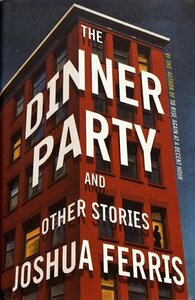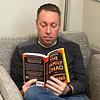Take a photo of a barcode or cover
I usually don’t give books two stars. I am conflicted because generally enjoy short stories. I also don’t have a problem with unlikable characters but EVERY SINGLE STORY had an awful main character. Reading the book jacket I expected “the stories to burrow deep into the often awkward and hilarious misunderstanding that pass between lovers and strangers.” I didn’t find anything hilarious about these short stories.
challenging
dark
mysterious
sad
medium-paced
As with most short story collections, this was a bit of a mixed bag. I *loved* The Breeze, liked a lot of the others and disliked a couple. Ferris tows the line between humor and heartbreak really well. His characters are always unsettlingly on the verge of becoming entirely unhinged; sometimes they crack and sometimes they don't, and it's a little stressful to watch. 3.5 stars.
Thanks to Goodreads and Little, Brown and Company for the early review copy!
Thanks to Goodreads and Little, Brown and Company for the early review copy!
emotional
inspiring
reflective
fast-paced
Plot or Character Driven:
Character
Strong character development:
Complicated
Loveable characters:
Complicated
Diverse cast of characters:
Yes
Flaws of characters a main focus:
Yes
When Ferris is on, he is riveting. Nobody writes stupid, self-centered, unselfaware male characters as well as he does.
But when's he's not on, he's...well, he's not.
I really, really liked about half these stories. The rest were somewhat forgettable.
But when's he's not on, he's...well, he's not.
I really, really liked about half these stories. The rest were somewhat forgettable.
I loved Ferris's first book, a beautifully detailed, very funny yet deeply felt novel about office workers. If he had sat down to write the novel I wanted to read, he could not have done better. He had a fan for life. So when his second novel, The Unnamed, was a sad and slow meditation on disease and love, I was there for it--I liked it, in a glum way. And when his third, To Rise Again at a Decent Hour, returned to his signature wry humour but was also very nearly an essay on the difference between faith and religion, I was startled but enthralled--and I found some of my own views mirrored, which very rarely happens. Joshua Ferris, man, I thought we were in it for the long haul.
So his first collection of stories--my favourite form--I had to like these, right? Well, I'd read a lot of them before in the New Yorker and I did like them. But taken en masse...eh. They're...glib. I am aware that some people are dumb, or insensitive, or ungenerous, or don't try hard to help others. Do I really need to spend a whole book feeling better than those people?
There's some very good writing here, some very funny moments and some genuine characters that drew me in, but for the most part, the stories are constructed so there's a clear moral divide with the author and the reader over here on the high ground and...well, I liked the complexity of the novels better. I like questions that don't have answers, or at least not easy ones. Some people think short stories are for simple questions and novels are for complex ones, but those people are idiots. Still, I'll probably be there for book five.
So his first collection of stories--my favourite form--I had to like these, right? Well, I'd read a lot of them before in the New Yorker and I did like them. But taken en masse...eh. They're...glib. I am aware that some people are dumb, or insensitive, or ungenerous, or don't try hard to help others. Do I really need to spend a whole book feeling better than those people?
There's some very good writing here, some very funny moments and some genuine characters that drew me in, but for the most part, the stories are constructed so there's a clear moral divide with the author and the reader over here on the high ground and...well, I liked the complexity of the novels better. I like questions that don't have answers, or at least not easy ones. Some people think short stories are for simple questions and novels are for complex ones, but those people are idiots. Still, I'll probably be there for book five.
Some intriguing stories - almost uniformly loathsome protagonists. “More Abandon...” will stick with me. Hopefully “A Fair Price” will not.
I had to realize again that I am not a short story reader. But I am happy I've read The Dinner Party by Joshua Ferris. To be honest, the last two stories made me decide on the 4 stars in the end. (It was a 3-star read up until that point.) The stories' quality fluctuates strongly, from "OMG this is cathartic!" through meh to downright boredom.
That Prague story (the last but one) was unbelievable, very very emotional for me, both on the personal and the social-political level. I also loved its characters (i.e. loved to hate them, at least the American ad guy). The last story (the quiet man who helped the main character to move his storage boxes in a truck) was the first where I laughed out loudly several places, just to hold my breath stunned and in shock for the last page or so. Fantastic.
That Prague story (the last but one) was unbelievable, very very emotional for me, both on the personal and the social-political level. I also loved its characters (i.e. loved to hate them, at least the American ad guy). The last story (the quiet man who helped the main character to move his storage boxes in a truck) was the first where I laughed out loudly several places, just to hold my breath stunned and in shock for the last page or so. Fantastic.



